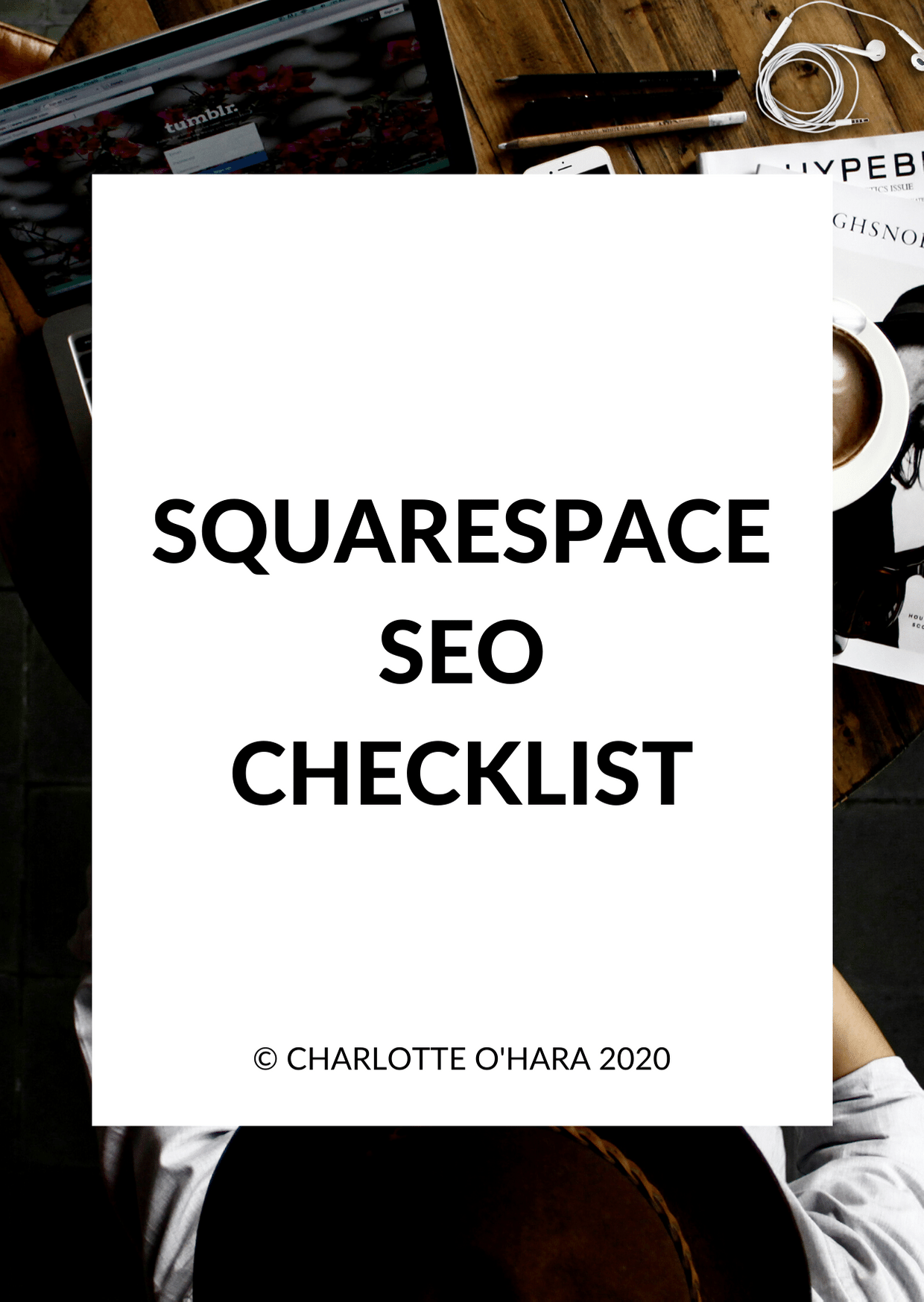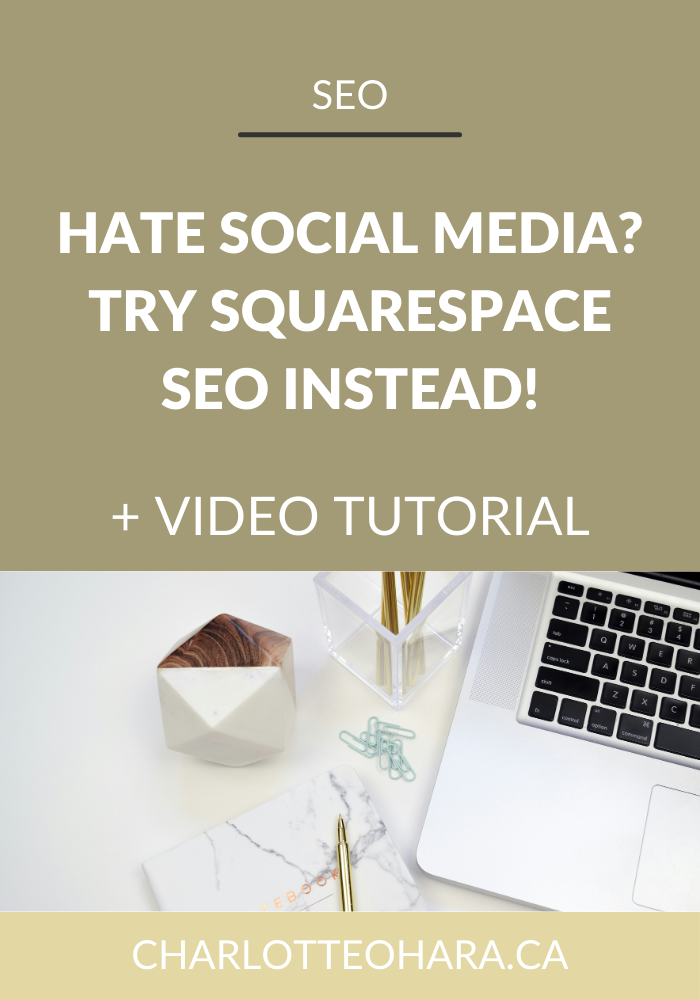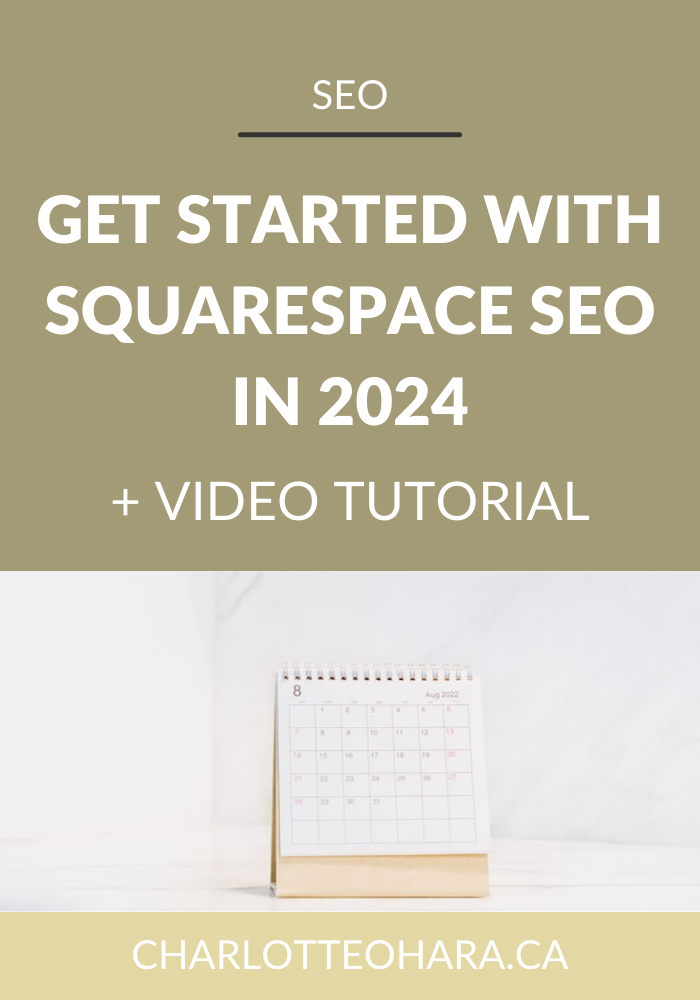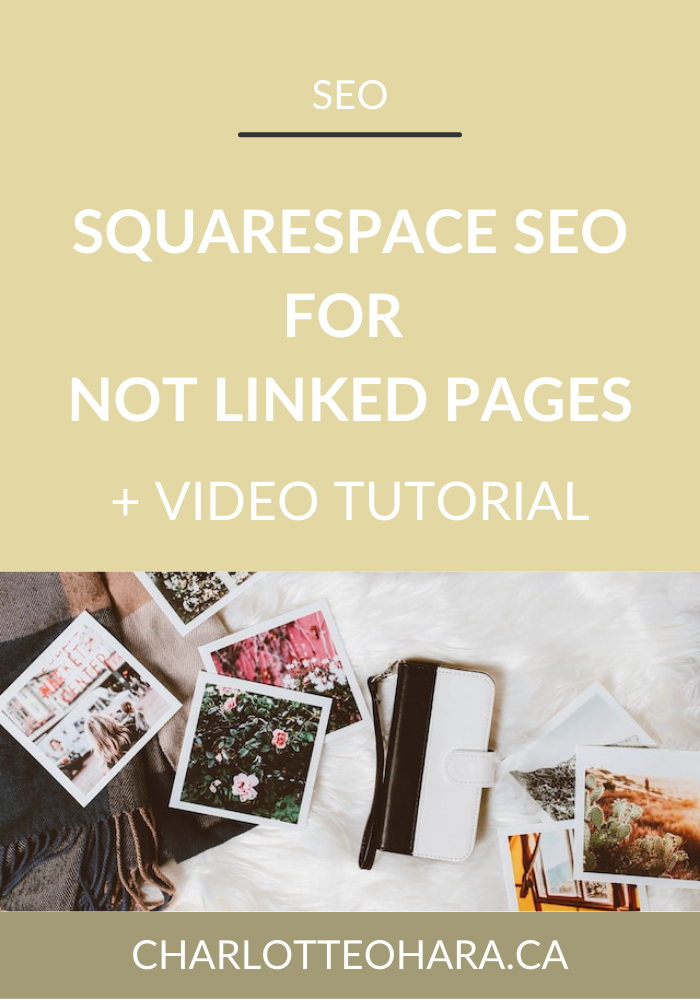Everything you need to know about Page Speed and Squarespace SEO
Ummmmmm, I can’t believe it has taken me this long to talk about page speed here on the blog 🙈
Better late than never, am I right?
If you’re anything like me, you’ve probably got the need for speed (thanks to all the Mario Kart we played growing up). Fast cars, speedy takeout delivery, and one minute or less text replies.
So why should your website be any different?
Like, DUH we all want the pages on our websites to load ASAP! Nobody wants to wait around for a random image to display, you know what I mean?
Page speed is a key part of Squarespace SEO but it’s also SUPER important from a user experience point of view as well. I can’t wait to dive into this topic and fill you in on everything you need to know about page load time.f
As a Squarespace SEO expert and leader in this super random little niche, it’s my job/pleasure to introduce you to things like this and present it in a way that makes you think, yes Charlotte I can handle this!
This is the kind of insider info that I share with my Squarespace SEO consulting clients and students in my online course, Top Squarespace SEO. But since I’m not one for secrets and truly want the best for anyone with a website, I’m giving you the summarized goods here - totally for free!
Read the blog post or watch the video tutorial below - either way, page load speed is hella important and something you can’t ignore. Bonus: your website visitors will thank you for speeding things up!
Some of you reading this might be totally new to Squarespace SEO and are looking for an introduction to this topic, someone to hold your hand and show you it’s not actually that scary. On the flip side, you might already be familiar with a few points on this list already but maybe you are looking for confirmation that you’re on the right track and haven’t missed anything important. No matter where you are in your Squarespace SEO journey, I know you’ll benefit from this info!
Alright, let’s get straight to it - read the post and watch the video tutorial below to learn all about page load time and how it relates to Squarespace SEO!
Related:
SQUARESPACE SEO SERIES
I have so many tips to share on the subject that it would have been crazy to put it all in one article! There are many misconceptions about Squarespace SEO which is why I've dedicate so many posts to this topic. Enjoy!
Click to view all posts in the Squarespace SEO Series
Visit my Squarespace SEO page for lots more resources.
Page speed and Squarespace SEO - what it is, how it works, how to test it
This video tutorial shows a demo website using the Rally template (Brine family, Squarespace 7.0) but the process is the same if you’re using Squarespace 7.1
Page speed vs page load time
6 of one, half a dozen of the other.
Same-same but different.
Two of a kind.
Page speed and page load time basically mean the same thing.
What is page speed?
Page speed is the amount of time it takes to display the full content of a page to the website visitor. In other words, it’s a metric that you look at.
Think: text, images/graphics, embedded video, any third-party code that you’ve inserted (e.g., a newsletter or freebie opt-in block, or a countdown timer).
From the moment someone clicks to and lands on the page, page speed looks at how long it it takes for them to see and be able to interact with everything.
Page speed matters for user experience
Page speed is an important metric to look at for a lot of different reason but arguable the most important is user experience.
Doesn’t matter if we’re talking about a web page, product page, blog post, photo gallery - whatever.
Think about it: if a page is slow to load then it means there’s a negative user experience. It’s annoying AF.
On the flip side, a page that is fast to load and displays the full content super quickly will contribute to a positive user experience! This is what you should be aiming for :)
page speed negatively affects bounce rates
Along those lines, page speed has a direct impact on the page’s bounce rate.
What this means is that if the page load speed is SLOW then the site visitor is more likely to leave the page (because the content isn’t displaying as quickly as they expect so they aren’t seeing value), thus contributing to a higher bounce rate. This is a BAD scenario and something we want to avoid at all costs!
On the flip side, if the page load speed is normal/fast then it’s less likely to be a factor that contributes to the bounce rate. This means that people might still click away from your site but it’s probably not because the page was slow to load - there must be another reason.
Reminder that the goal is to have a relatively low bounce rate on your website. Therefore, we want to avoid slow page load times because those go hand in hand with high bounce rates. Ya dig?
slow page load speed means less time spent on the page
Ok so we’ve established that you don’t want people to bounce away from your page.
This means that you want people to spend LOTS of time on the page!
Think about it: if people spend more time on the page, they’re more likely to read the page’s copy, purchase a product, book or inquire about a service, sign up for your email list, read more related blog posts, etc.
The flip side of this is that the less time someone spends on the page, the less likely they are to engage with your content let alone convert (in whatever metric you’re evaluating).
In other words, the more time a site visitor spends on your site (or on your website in general), the better it is for you! So, we want to do everything we can to make it as easy as possible for people to spend time on our website, more specifically on the page itself.
This is where page load speed comes in.
If a page is fast to load, then the visitor is more likely to spend time on that page. Conversely, if a page is SLOW to load, then the visitor is less likely to spend time on that page (meaning: you miss out on the value of their visit).
Imagine that someone does a Google search and your website/web page shows up in the search results. They click over to your site without knowing anything about you, your brand, your business/offerings. If the site is slow to load then obviously they are going to be frustrated and just leave without waiting for/seeing all the amazing things you have to offer. If, however, they land on your page and the content loads quickly then they are more likely to check out all your gorgeous keyword-rich, longform content, your portfolio galleries, services outlines, product descriptions, etc.
So yeah, page speed matters a lot if you want someone to spend time on your web pages (which you do haha).
Slow page load times negatively affect conversions
I hinted to this point above but basically if a web page is slow to load then it means that you’re less likely to convert the site visitor.
Now, “conversion” can mean different things depending on the type of website you have, the page we’re talking about, what your goals are, etc. But here are a few examples of conversions:
Book your services
Inquire about a discovery call
Purchase a product
Add related items to their shopping cart
Read related blog posts
Engage with content - like, comment, share, subscribe, etc.
Sign up for newsletter
Opt-in for a freebie
As you can see, there are loads of different ways to evaluate conversions on a web page but all of these factors help you to grow your website and get you closer to your goals!
But none of things are going to happen if the page load speed is slow.
A guaranteed way to decrease conversion rates is to have a page that loads slowly. Therefore, we want our pages to load quickly so that we don’t miss out on those valuable conversions!
Google also cares about page speed!
Ok so obviously we care about page load speed from a user experience point of view. And hopefully the points above have convinced you that you prioritize it too.
But let me also remind you that GOOGLE, the world’s biggest & most powerful search engine, also cares about page speed! It’s a big factor in their SEO algorithm.
Remember that Google sends out their little robots to crawl & index the content of your website. That means all the pages, blog posts, product pages, galleries, event pages, etc. - they visit them all.
Google has something called a “crawl availability budget” and they can really on do so much on each page given the budget allocated to your website. This is a little technical but basically if your pages are slow to load then it’s harder for Google to get the full indexation of your site. And therefore, they are less likely to reward you with high rankings in search results. meaning, a negative impact in how your website shows up for your target audience who is doing online searches, even if it’s for the keywords you’re targetting.
Best practices for page speed - how to speed it up
Images
Images are hands down one of the most impactful ways to slow down/speed up page load times.
This applies to all the images on any type of page, whether it’s an inserted image block, a background header image, a gallery, etc.
When it comes to images, obviously you want to make sure that each image is correctly named for maximum SEO value, but specifically for page load speed we also want to ensure the image is a small file size. the bigger the image file size, the slower it will be to load. So, use a tool like Tinypng.com to compress the image into a smaller file size, and THEN upload that compressed (smaller) image file to your page/site.
So if you have a lot of large images with big file sizes on your site that are slowing down the page load time, then you 100% want to compress the file and then re-upload it to the page so that the overall page load time is faster.
Yes it’s annoying & tedious to do this but trust me, it’s worth your while and there is an immediate & positive payoff.
Take a look at the images across your site, on all page types:
web pages
blog posts
product pages
galleries
event pages
etc.
And fix them as needed. IT’S WORTH IT, I promise!
Minimize, clean up & compress code
Anytime you’ve added code to a page on your website, it has to load and display so that people/Google can see it or interact with it.
A lot of the code that you add will be short & sweet and wont have a huge effect on page load speed…. but that’s not always the case!
If you have any sort of code added to your website, review it and do your best to clean it up so that the code isn’t slowing down the page load time.
Two common culprits might include custom email newsletter code blocks (e.g., for newsletter opt-ins or freebie downloads) and countdown timers, but basically any type of code applies here.
If you don’t need the code any longer, delete it.
If the code is redundant or unnecessarily long, clean it up.
if you can shorten up the code, do it.
It’s super common to have code left over on a page for whatever reason, and in many cases you can safely remove it or can clean it up/shorten it, which will have a positive affect on the page load speed.
Related:
Reduce unnecessary URL redirects
Anytime you have a URL redirect, it means that the page will be slower to load than a direct URL link. Because you’re sending the site visitor from A > B > C when instead you could just send them from A > C, you know?
To learn more about URL redirects, you can read this post: The real reason why URL redirects are so important for Squarespace SEO
To be clear, URL redirects aren’t bad and there are many legit reasons why you might set them up! However, if they can be avoided in the first place then don’t do it haha
Consider your website’s hosting platform
I’m going to guess that most people who are reading this blog post already have/are going to build their website on Squarespace. YAY!
Squarespace is a fantastic website hosting platform. It’s a big established company with powerful hosting services and they are going to do everything in their power to keep it that way LOL
I’ve built my website on Squarespace and trust them to host my site after all ;)
The thing is, not all hosting platforms are created equal. Let’s say your website is hosted by another platform other than Squarespace. It’s possible that the host is bad/not as good and therefore it could be a factor that contributes to a slow load speed.
If you website is hosted with Squarespace then rest assured, you will never have a slow page speed just because your site is on Squarespace. Your website might be hosted on Squarespace and still be slow to load (because of any of the reason listed above) but the HOSTING will not be the problem. Get it? Good.
Test page speed on your website
There are many different tools that you can use to test the page speed or page load time on your own website but one of the best & simplest is Google PageSpeed Insights.
So if you’ve ever wanted to test your page speed, you can do it super simply! It’s very straightforward and you can follow the steps outlined.
This will give you a great insight into the page speed that you’re working with across your site.
Real talk: your page speed is probably fine :)
If you have a basic website then odds are your page speed or page load time is probably fine.
Obviously if you have a LOT of images/galleries/custom code on your pages then your page load speed might have room for improvement if you want best SEO results.
But in many/most cases, you’re going to be alright especially if you keep my tips in mind!
If you DO notice that you page load speed is slower than you’d like then don’t panic, just make a few key tweaks and I’m sure you’l start seeing an improvement right away!
Final Thoughts
And there you have it, a friendly reminder to NOT reuse the same SEO description across your Squarespace website!
Please, please please make sure that you are writing unique and customized SEO descriptions for the different pages, blog posts, products and galleries across your site.
Use natural language, include relevant keywords and clearly describe to Google what each individual piece of content is about.
The SEO description fields are a small feature that packs a huge punch so please fill it out correctly, that’s how you’ll get the best results!
Now it's your turn to tell me, have you filled out the SEO description fields on your Squarespace website? Did you copy & paste the same one or write unique descriptions for each page? Have you ever used a template for the products?
Leave me your questions down in the comments below and I’ll do my best to answer them. As people are spending more time online than ever before, it’s SO important that your website shows up properly in search results so that you can reach your ideal audience online - but you can’t do this without SEO!
If you want more SEO goodness, be sure to check out my Squarespace SEO page for all resources on the topic.
My signature online course, Top Squarespace SEO, will be opening for enrollment again soon - sign up for the TSS waiting list here!
You can also sign up for my newsletter (right here or below), where I often share Squarespace SEO tips, tricks and high-quality exclusive content. I send out emails to my list every Wednesday, mostly focused on Squarespace websites and SEO, and I can guarantee that you’ll find the newsletter topics interesting, entertaining and worth your time. #humblebrag
Finally, shameless plug: hit me up with any specific questions you have about Squarespace SEO and your website because I’m your girl. You can reach out to me directly if you’re interested in working together on your website and we can talk about whether or not you would be a good fit for my consulting and ongoing services. I can’t take on every request to do Squarespace SEO consulting but I do pick a few websites and businesses to work with every month and I’d love for you to be one of them.
You may also be interested in:
Top Squarespace SEO - online course details and enrollment
Squarespace SEO for Affiliate Marketing - masterclass













